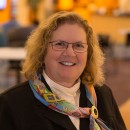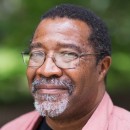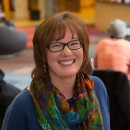School of Social Work News
Pages


 Mary Ruffolo, Brian Perron and Betsy Voshel's Book Published by SAGE
Mary Ruffolo, Brian Perron and Betsy Voshel's Book Published by SAGEProfessor Mary Ruffolo, Associate Professor Brian Perron and Clinical Associate Professor Betsy Voshel’s book, “Direct Social Work Practice: Theories and Skills for Becoming an Evidence-Based Practitioner” was published by SAGE.
- February 25, 2015
- Learn more »
 Brian Perron's Book, "Key Concepts in Measurement" Published by Oxford University Press
Brian Perron's Book, "Key Concepts in Measurement" Published by Oxford University PressAssociate Professor Brian Perron’s book, "Key Concepts in Measurement” was published by Oxford University Press. The book was co-written with his colleague, David Gillespie, Emeritus Professor at Washington University in St. Louis.
- February 24, 2015
- Learn more »
 Larry Gant Cited in Michigan Daily Article, "Paige Pfleger: Tyree Guyton's 'Inextinguishable' Heidelberg Project"
Larry Gant Cited in Michigan Daily Article, "Paige Pfleger: Tyree Guyton's 'Inextinguishable' Heidelberg Project"Professor Larry Gant was cited in the Michigan Daily article, "Paige Pfleger: Tyree Guyton's 'Inextinguishable' Heidelberg Project". He was a panelist at "Inextinguishable: A Conversation with Detroit Artist Tyree Guyton", hosted by the U-M Museum Studies Program.
- February 23, 2015
- Learn more »
- Joseph Galura Co-Writes Chapter in New Book, "Asian Americans in Michigan: Voices from the Midwest"
Adjunct Lecturer Joseph Galura has co-written a chapter in a new book, “Asian Americans in Michigan: Voices from the Midwest”. The chapter is "A Brief History of Filipinos in Michigan" by Emily P. Lawsin and Joseph A. Galura.
- February 20, 2015
- Learn more »
 Julie Ribaudo Selected as 2015 SSW Student Union Teacher of the Year
Julie Ribaudo Selected as 2015 SSW Student Union Teacher of the YearClinical Associate Professor Julie Ribaudo was selected as the 2015 SSW Student Union Teacher of the Year. She will be recognized at the Student Awards Ceremony in March. Below are several student statements about Professor Ribaudo:
"Julie has such wisdom and compassion from her experiences and an amazing ability of teaching this wisdom in a way that is both clear and sensitive to the identities and unique needs of each student. She teaches her course content with a strong PODS lens and is mindful of the diverse experiences and identity intersectionalities of her students. I've learned so much in her courses thus far and want to take every mini course offered with her! Julie is truly the epitome of empathy and compassion!"
"She has so much passion for what she teaches that it rubs off on her students. She also has a huge depth of knowledge that anyone wanting to pursue social work would be lucky to be exposed to."
"Julie has been an amazing teacher. I have learned more from her in my classes than I have in any of my others. She creates an open, safe class environment where people feel comfortable speaking their minds and are able to build meaningful relationships with one another. She also was very helpful with the transition back into a school setting first semester, and was conscious and understanding of the fact that many people were having a difficult time transitioning."- February 16, 2015
 Daphne Watkins and Jaclynn Hawkins (PhD Student) Published in Research on Social Work Practice Journal
Daphne Watkins and Jaclynn Hawkins (PhD Student) Published in Research on Social Work Practice JournalAssistant Professor Daphne Watkins and Jaclynn Hawkins' (PhD student) article, "The Discipline’s Escalating Whisper: Social Work and Black Men’s Mental Health" was published in the March issue of Research on Social Work Practice journal.
- February 15, 2015
- Learn more »
 David Cordova Selected for Visiting Professor Program at UCSF Center for AIDS Prevention Studies
David Cordova Selected for Visiting Professor Program at UCSF Center for AIDS Prevention StudiesAssistant Professor David Cordova was selected for the National Institutes of Health-funded Visiting Professor Program at the University of California San Francisco Center for AIDS Prevention Studies.
- February 15, 2015
- Learn more »
- Desmond Patton and Reuben Miller Co-author Research Review for Academy of Violence and Abuse
Assistant Professors Desmond Patton and Reuben Miller co-authored the Academy of Violence and Abuse’s Research Review - “Examining the Relationship Between Adolescent Violence Exposure and Adulthood Violence Perpetration Among Urban Black and African American Men”.
- February 14, 2015
- Learn more »
 Brad Zebrack Contributes to Handbook of Oncology Social Work: Psychosocial Care for People with Cancer
Brad Zebrack Contributes to Handbook of Oncology Social Work: Psychosocial Care for People with CancerAssociate Professor Brad Zebrack was a section editor and author of the inaugural Handbook of Oncology Social Work: Psychosocial Care for People with Cancer, which was published by Oxford University Press. The book provides a repository of the scope of oncology social workers’ clinical practice, education, research, policy and program leadership in the psychosocial care of people with cancer and their families.
- February 9, 2015
- Learn more »
- Jorge Delva Selected as a 2015 Center for Healthcare Research & Transformation Policy Fellow
Associate Dean Jorge Delva was selected as a 2015 Center for Healthcare Research & Transformation Policy Fellow.The 2015 class brings six researchers from U-M and six Lansing policymakers together to learn from a broad range of health policy leaders and subject matter experts, and to learn from each other.
- February 6, 2015
- Learn more »